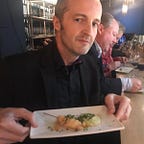Conflict and error are human constants?
What can Wikipedia tell us about trust?
No one seems to know for sure when humans started cooking, but most would agree that cooking was the technological leap (not in fact the 2001 monolith) that allowed humans to advance beyond an animal livelihood, to spend less time micromanaging their survival, and to go on to do greater things — basically thanks to a greater energy intake per unit time.
Like cooking, trust is a strategic choice that allows us to spend less time attending to (or micromanaging) essential processes that require our attention. Many processes (especially those arising in nature) are bursty in nature and therefore only require spotty interest. We can get by happily by checking whether progress is being made just occasionally–checking from time to time, rather than obsessively asking “are we there yet”?
The watched pot never boils and that’s because we can’t tell time is passing when we focus on smaller and smaller intervals of time in a fit of mistrust.
In 2006, my friend and colleague Jan Bergstra and I started to think about trust through the lens of Promise Theory on a visit to the University of Bremen, sponsored by the EMANICS research Network of Excellence. As we were developing our early ideas, disappointed with what people had written earlier about trust, we came to understand about half of the problem surprisingly…
